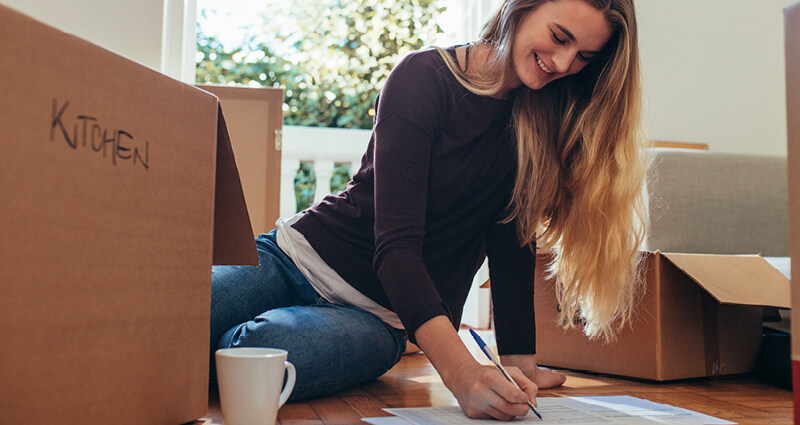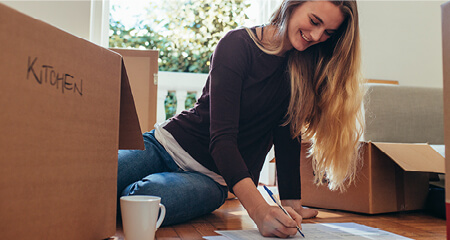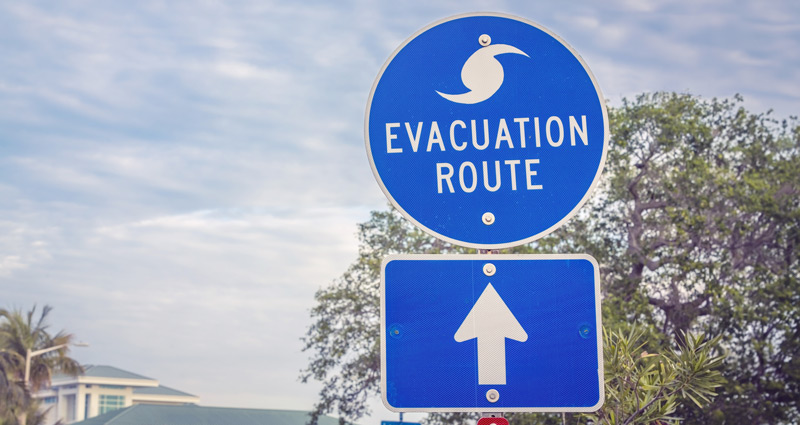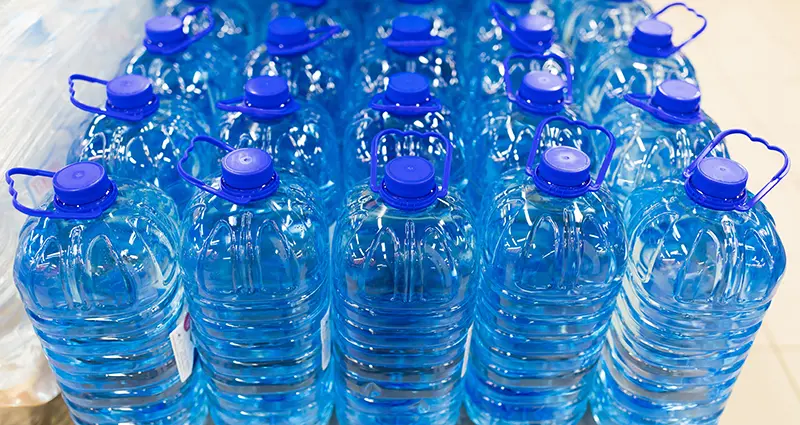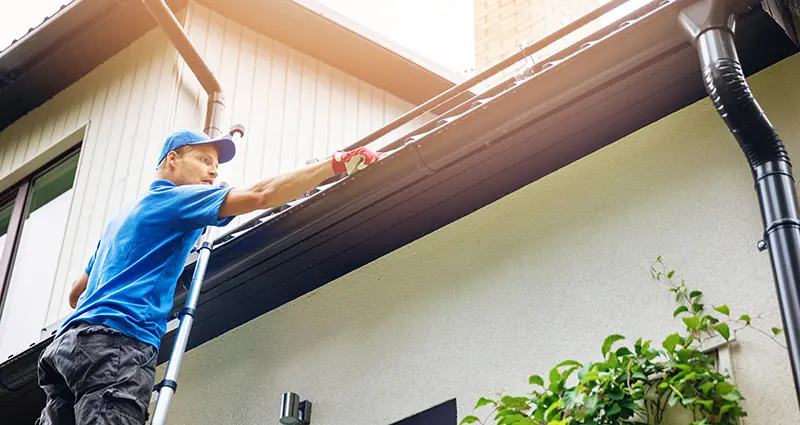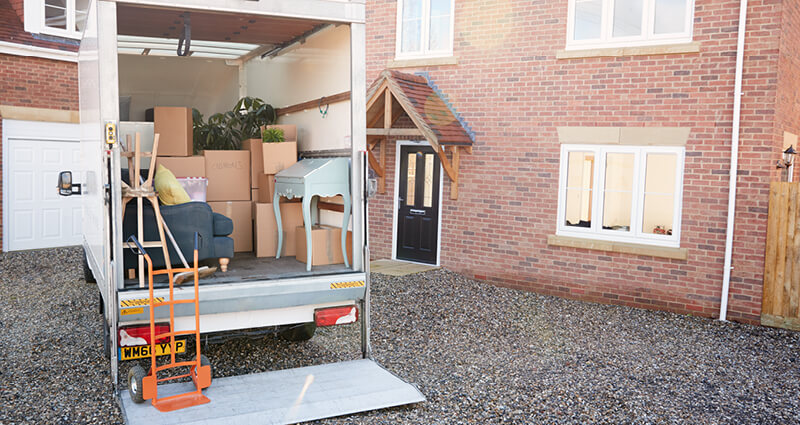Everything you need to do before, during and after a move
2 months out
- Make your own moving timeline. Start planning out your move a couple of months ahead and create a list of things you need to get done.
- Declutter. Have a garage sale or make a charitable donation. If you're moving out of town, clean out lockers at your gym or children's schools, P.O. box, safe deposit box and any other secure location where you are storing your belongings.
- Contact realtor. Let them know your timeline and ensure everything is ready with the seller.
1.5 months out
- Get moving supplies: boxes, tape, packing, markers, etc.
- Make travel plans. For far away moves, arrange airfare, hotels, car rental, etc.
- Create a folder for moving expenses, including receipts, bills and other records. You might be able to deduct your moving expenses on your next tax return.
- Research moving insurance options. If moving insurance is right for you, look for the best way for your family to protect your belongings during the move.
- Research moving trucks and companies. Look for reviews and recommendations and get in-home estimates for the most accurate pricing.
1 month out
- Finish up current home repairs.
- Start packing early. Begin with things you use infrequently and create a packing schedule to pace yourself and don't wait until the last minute.
- Organize boxes and gather important records. Pack jewelry, valuables and medical or school documents separately. It’s a good idea to move these in your car so there is no risk of losing them.
- Update your records with change of address. Notify bank, insurance company, employer, subscription services, credit cards and doctors of new address. Also, let friends and family know your new location.
- Move confirmation. Get date, cost and insurance confirmation from movers. Read the fine print.
- Send copies of school records to your kids’ new school.
- Research new medical care, plumbers, electricians and other service providers in your new area. You'll want to have their numbers on hand in case of an emergency.
2 weeks out
- Request time off work. Having an extra day or two to prepare, move or unpack will be invaluable.
- Safe deposit box. Put valuables in a security box for moving. Create a private inventory of your valuables and where they are packed.
- Clean out your home. Hire cleaners to get new home and old home ready. Return borrowed or rented items and donate or sell anything you don't want.
- Have your vehicle serviced, especially if you are moving long-distance.
- Make a Kids Kit. Coloring books, crayons and games are great ways to keep kids from boredom during a move.
- Schedule sitters for kids and pets on moving day.
1 week out
If renting, set up a final walkthrough with landlord to get security deposit back. If you can't be there for the walkthrough or are selling your home, take photos of your empty place to prove it's in good condition and ready for the next residents.
Secure all your important documents, jewelry and other valuables to transport them yourself so they don't get lost.
Few days out
- Defrost, empty and clean refrigerator. Plan meals that will allow you to use any remaining food in your refrigerator and pantry. Donate your extra nonperishable food to Move for Hunger.
- Reconfirm movers' arrival time and contact info. If you're moving to an apartment, find out about parking your moving truck at your new place and reserving the elevator if necessary.
- Pack your plants.
- Get cash for movers' tip, food and other last minute items.
- Drain water hoses on your washing machine and ice maker.
- Empty oil and gas from grills, heaters, lawn mowers, snow blowers and other tools.
- Final walk-through. Check closets, drawers, cabinets and garage. Turn off lights, back lock windows and doors.
- Get connected. Make sure your current utilities are disconnected (electricity, gas, water, etc.) the day after you move and ensure that your new utility services are connected the day before you move into your new home. Also, make sure you're signed up for curbside trash and recycling in your new city.
Moving day
- Pack a bag for the first night in your new home. Include multi-tools, change of clothes toiletries, medicine, plastic eating utensils, toys, blankets and pillows, charging cords, and trash bags.
- Check that all items are off moving truck. Review bill of landing (list of shipped items).
Moving to a new home can be an exciting adventure, but a lot goes along with moving that can make the process stressful. Whether you’re moving by yourself, with your family or with roommates, staying organized and preparing for your move early will help you avoid having a bunch to do at last minute. The best way to make sure you get everything taken care of for a stress-free move is to maintain a moving checklist. From researching and scheduling movers, organizing records and medications and keeping kids occupied on moving day, we share our moving checklist and timeline for a smooth move.
Stay organized and stress-free during your move with this moving timeline
- One month before moving day: donate unneeded items, measure your large furniture, organize records, research movers, collect moving materials and notify your contacts of your move.
- 1-2 weeks before moving day: confirm your movers, start on packing, keep a week’s worth of clothes within easy access and refill prescriptions. Be sure to always separate and keep your valuables with you rather than loading them on the moving truck.
- On moving day: check the moving truck and company, sort items to go into the truck, keep kids occupied, keep trash bags on hand and take care of yourselves!
Moving can be a long and difficult process, but using these moving tips will help you stay stress-free throughout the process. Make sure to pace yourself during preparation and on the day of so you don’t feel overworked and moving can remain a fun and exciting process.
We wish you the best in your new adventure. Check out more moving tips here!























